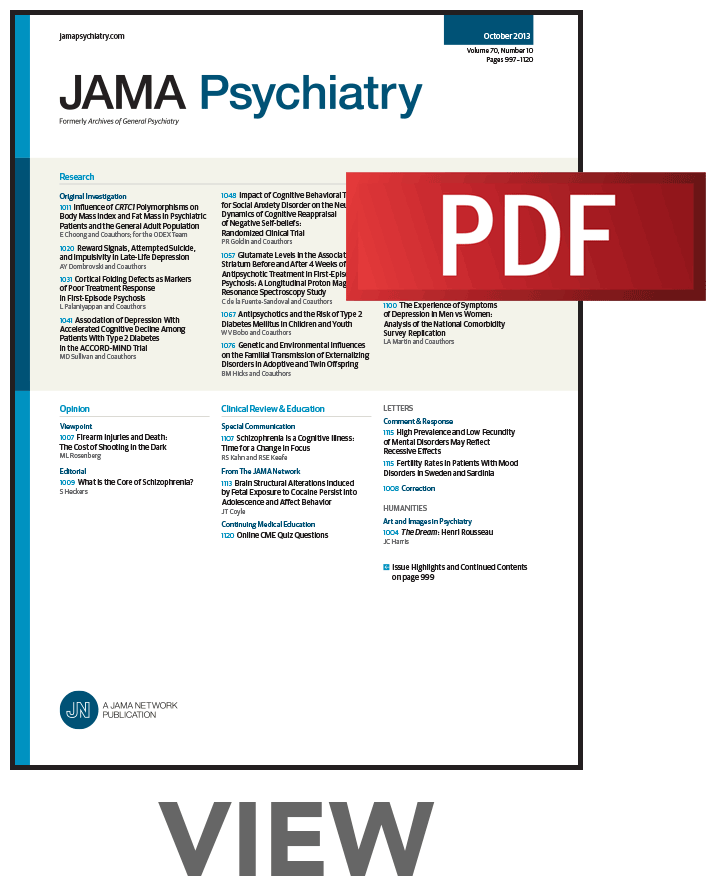Brief Cognitive Behavioral Therapy for Suicidal Military Personnel and Veterans
IF 17.1
1区 医学
Q1 PSYCHIATRY
引用次数: 0
Abstract
ImportanceUS military personnel and veterans have higher rates of suicide than the general population. Previous trials support the efficacy of brief cognitive behavioral therapy (BCBT) for reducing suicide attempts among military personnel compared with treatment as usual, and replication of these findings is needed.ObjectiveTo test the efficacy of BCBT for reducing suicide attempts and suicidal ideation among high-risk military personnel and veterans.Design, Setting, and ParticipantsThis was a 2-arm, parallel randomized clinical trial comparing BCBT with present-centered therapy (PCT), conducted from 2020 to 2025. The setting was 3 US-based outpatient psychiatric clinics and included US military personnel and veterans reporting suicidal ideation during the past week and/or suicidal behavior during the past month who were either self-referred or referred by their mental health clinicians.InterventionsParticipants were randomly assigned to either BCBT, a psychotherapy that teaches emotion regulation skills, or PCT, a problem-solving psychotherapy, using a computerized algorithm with stratification for sex and number of prior suicide attempts.Main Outcomes and MeasuresThe primary outcome was suicide attempt, assessed with the Self-Injurious Thoughts and Behaviors Interview–Revised.ResultsOf 154 individuals assessed for eligibility, 108 (mean [SD] age, 32.8 [12.8] years; 79 male [73.1%]) were enrolled. Fewer patients receiving BCBT (n = 2, estimated proportion = 5.6%) than PCT (n = 8, estimated proportion = 27.9%) attempted suicide during follow-up. Mean time to first suicide attempt was 638.6 (90% CI, 557.8-719.3) days in the PCT group vs 755.9 (90% CI, 715.1-796.8) days in the BCBT group (log-rank χ军人和退伍军人自杀的认知行为治疗简介
重要的是,美国军人和退伍军人的自杀率高于普通人群。先前的试验支持短期认知行为疗法(bbct)在减少军人自杀企图方面的效果,与常规治疗相比,这些发现还需要复制。目的探讨bbct对降低高危军人和退伍军人自杀企图和自杀意念的效果。设计、环境和参与者:这是一项2组平行随机临床试验,比较bbct和以现在为中心的治疗(PCT),从2020年到2025年进行。研究对象为美国3家精神病门诊诊所,包括在过去一周内有自杀意念和/或在过去一个月有自杀行为的美国军人和退伍军人,他们要么是自我推荐的,要么是由心理健康临床医生推荐的。干预措施参与者被随机分配到BCBT(一种教授情绪调节技巧的心理治疗)和PCT(一种解决问题的心理治疗),使用计算机化算法对性别和之前的自杀企图进行分层。主要结果和测量主要结果是自杀企图,用自我伤害思想和行为访谈-修订版进行评估。结果154例入选者中,108例(平均[SD]年龄32.8[12.8]岁,男性79例[73.1%])入选。随访期间,接受BCBT的患者(n = 2,估计比例= 5.6%)比接受PCT的患者(n = 8,估计比例= 27.9%)自杀未遂。PCT组至首次自杀企图的平均时间为638.6 (90% CI, 557.8-719.3)天,而BCBT组为755.9 (90% CI, 715.1-796.8)天(log-rank χ21 = 3.6; P = 0.03)。bbct显著降低了任何自杀企图的风险(风险比[HR], 0.25; 90% CI, 0.07-0.90; P = 0.04)以及随访自杀企图率(每参与者年0.06 vs 0.18次,风险比,0.24;90% CI, 0.08-0.70; P = 0.02)。两组患者自杀意念均显著降低(f8264 = 7.2, P <)。001),组间差异无统计学意义(f8266 = 0.2; P = 0.49)。结论和相关性这项随机临床试验发现,与积极对照相比,bbct减少了美国军人和退伍军人近期报告自杀意念和/或自杀行为的自杀企图。这些结果重复了早期的发现。临床试验注册号:NCT03769259
本文章由计算机程序翻译,如有差异,请以英文原文为准。
求助全文
约1分钟内获得全文
求助全文
来源期刊

JAMA Psychiatry
PSYCHIATRY-
CiteScore
30.60
自引率
1.90%
发文量
233
期刊介绍:
JAMA Psychiatry is a global, peer-reviewed journal catering to clinicians, scholars, and research scientists in psychiatry, mental health, behavioral science, and related fields. The Archives of Neurology & Psychiatry originated in 1919, splitting into two journals in 1959: Archives of Neurology and Archives of General Psychiatry. In 2013, these evolved into JAMA Neurology and JAMA Psychiatry, respectively. JAMA Psychiatry is affiliated with the JAMA Network, a group of peer-reviewed medical and specialty publications.
 求助内容:
求助内容: 应助结果提醒方式:
应助结果提醒方式:


